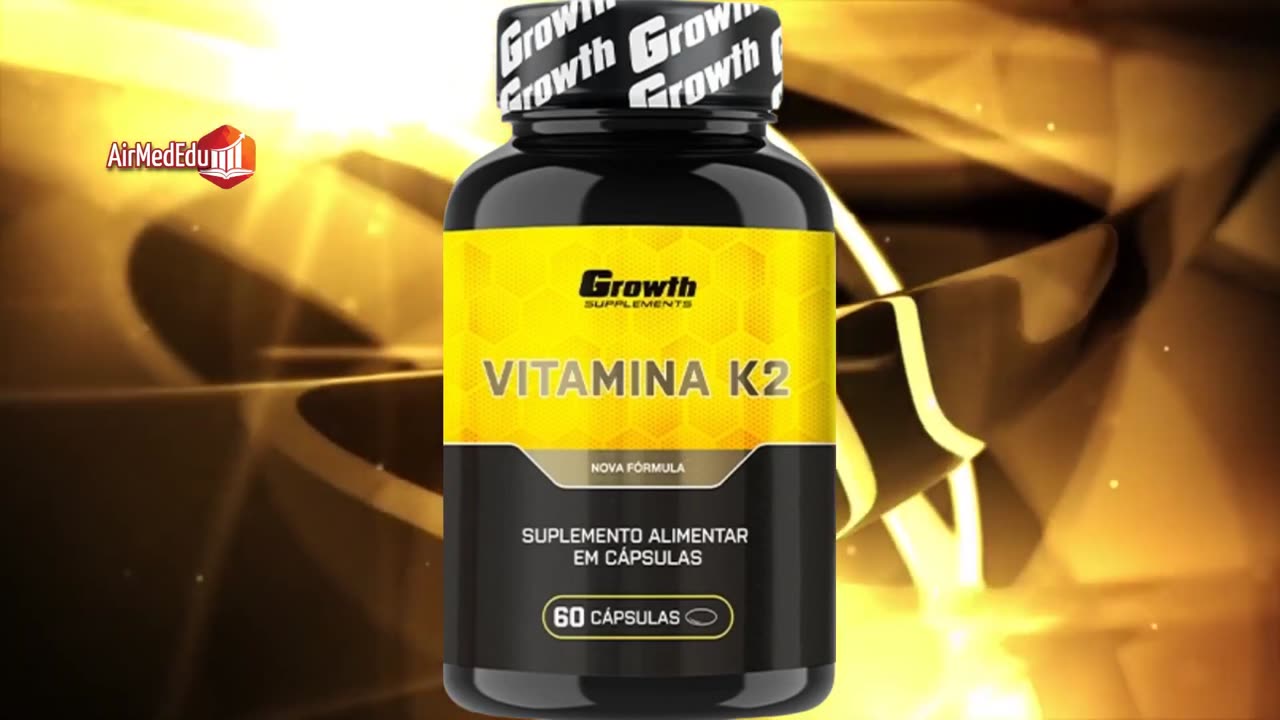Premium Only Content

Vitamin K2 and its Effect on Specific Organs
Vitamin K2, a lesser-known member of the vitamin K family, has gained recognition in recent years for its crucial role in human health. Although initially linked to blood clotting, recent research has revealed its importance in multiple physiological processes, from bone to cardiovascular health. Below, we explore in depth the pharmacological effects of vitamin K2 on specific organs, its health benefits, appropriate dosage, potential side effects, and special considerations for specific populations.
Vitamin K2 plays an essential role in the activation of vitamin K-dependent proteins, such as osteocalcin and matrix Gla protein. These proteins are critical for directing calcium to bones and preventing its accumulation in soft tissues such as arteries and kidneys.
Osteocalcin, produced by osteoblasts, requires vitamin K2 for activation. Once activated, this protein facilitates bone mineralization by binding calcium to the bone matrix. In the absence of adequate levels of vitamin K2, calcium can be deposited in arteries rather than bones, increasing the risk of osteoporosis and fractures.
Matrix Gla protein is another vitamin K2-dependent protein that inhibits arterial calcification. Studies have shown that insufficient vitamin K2 levels are associated with stiff arteries and an increased risk of cardiovascular diseases such as atherosclerosis.
Vitamin K2 also plays a protective role in the kidneys by preventing calcification in these organs. This is particularly relevant for patients with chronic kidney disease, who are prone to developing vascular calcifications.
Emerging research suggests that vitamin K2 may have a positive impact on cognitive function. Its ability to reduce inflammation and oxidative stress may protect against neurodegenerative diseases such as Alzheimer's.
The recommended dose of vitamin K2 varies depending on age, health status, and therapeutic goals. General guidelines are provided below:
The Standard Adult Dose is 100–200 micrograms daily; this is the most commonly used dose for cardiovascular and bone benefits.
For children, although there are no universally accepted specific recommendations, doses of 50-75 micrograms daily may be adequate.
For older adults, 150-300 micrograms daily may be necessary to combat accelerated bone loss and prevent arterial calcification.
Patients with osteoporosis have a higher dose (200-300 micrograms daily) that may be helpful in combination with vitamin D and calcium.
For patients with cardiovascular disease, doses of 180 micrograms daily have been shown to be effective in clinical studies in reducing the risk of arterial calcification.
- In children under 12 years of age, a pediatrician should be consulted before supplementation.
- Pregnant or breastfeeding women should receive personalized medical guidance due to their specific needs during these periods.
Below, we will explore some key benefits that this nutrient can provide to overall well-being, supported by scientific studies and clinical evidence.
Vitamin K2 acts as a cofactor in the activation of proteins such as osteocalcin, which is essential for binding calcium to the bone matrix, strengthening bones.
Adequate vitamin K2 intake may reduce the risk of osteoporosis, especially in postmenopausal women, by maintaining healthy bone density.
By strengthening bones, vitamin K2 significantly reduces the likelihood of fractures, especially in older adults.
This nutrient helps prevent calcium from depositing in the arteries, a key factor in preventing cardiovascular disease.
Vitamin K2 contributes to keeping arteries flexible and healthy, which is crucial for good blood circulation.
By preventing the buildup of calcium and plaque in the arteries, the risk of atherosclerosis, a condition that can lead to heart attacks and strokes, is reduced.
In people at risk of kidney calcification, vitamin K2 may play a protective role by regulating calcium levels in the body.
Vitamin K2 has antioxidant properties that help fight free radicals, reducing cell damage and premature aging.
Recent studies suggest that this nutrient may have a positive impact on memory and other cognitive functions.
Although more research is needed, some studies have linked vitamin K2 to a reduced accumulation of beta-amyloid plaques in the brain, a marker of Alzheimer's.
Vitamin K2 is essential for activating proteins involved in blood clotting, preventing excessive bleeding.
In older adults, this nutrient may counteract age-related bone loss, improving their quality of life.
By improving vascular health and reducing arterial stiffness, it may also lower blood pressure levels.
Vitamin K2 ensures that calcium is used where it's needed (bones and teeth) and doesn't accumulate in soft tissues like arteries or kidneys.
In patients with chronic cardiovascular disease, this nutrient may offer additional benefits by reducing calcium-related complications.
Some preliminary studies indicate that it may help control factors such as insulin resistance, abdominal obesity, and dyslipidemia.
In addition to Alzheimer's, it has been suggested that vitamin K2 may have a protective effect against other neurodegenerative diseases.
This nutrient strengthens tooth enamel by optimizing the use of calcium and other essential minerals for teeth.
Vitamin K2 may improve insulin sensitivity, a key factor in the prevention and management of type 2 diabetes.
By reducing levels of chronic inflammation, this nutrient helps prevent diseases related to prolonged inflammatory processes.
Its ability to improve cellular immunity may make people less prone to recurrent infections.
In early stages of growth, this supplement is crucial to ensure optimal bone development and prevent future problems.
Oxidized LDL cholesterol is a key factor in the development of cardiovascular disease; vitamin K2 helps reduce it.
Although indirectly, this nutrient contributes to a balanced metabolism that can promote healthy sleep patterns.
By optimizing calcium metabolism, it also benefits muscle function, reducing cramps and weakness.
In people with joint calcifications, this nutrient may relieve discomfort by preventing additional calcium deposits.
Chronic inflammation is a predisposing factor for several types of cancer; By reducing it, this nutrient may offer additional protection.
Vitamin K2's role in bone regeneration also speeds the healing process after fractures.
By preventing retinal calcifications, this nutrient may contribute to healthier long-term vision.
Finally, by reducing subcutaneous inflammation and improving blood circulation, this supplement may promote tighter, healthier skin.
Vitamin K2 is generally well tolerated when taken within the recommended doses. However, adverse effects may occur, especially at very high doses or in combination with certain medications.
Such as: Mild gastrointestinal discomfort (nausea or diarrhea).
- Allergic reactions (rash or itching).
- Severe abdominal pain.
Serious Side Effects, although extremely rare, include:
- Severe anaphylactic reactions.
- Liver disorders.
Warning Signs for Immediate Discontinuation include:
- Facial swelling or difficulty breathing (possible severe allergy).
- Persistent abdominal pain or severe vomiting.
Conditions Contraindicating Use include:
- People with a known allergy to vitamin K2 derivatives.
- Patients taking anticoagulants such as warfarin; these medications directly interact with the functions of vitamin K.
During Pregnancy: Although considered safe at low doses, a doctor should be consulted before supplementation.
- Liver disease: Medical supervision is required to avoid metabolic complications.
Vitamin K2 is especially beneficial for people with osteoporosis or at high risk of fractures, as it significantly improves bone density.
Those with atherosclerosis or arterial calcification may experience significant improvements in vascular elasticity and a reduction in cardiovascular risk.
Older adults are particularly vulnerable to bone and cardiovascular problems, making vitamin K2 supplementation a priority intervention.
Numerous studies have shown that vitamin K2 improves both bone density and cardiovascular markers. For example:
- A study published in Thrombosis and Hemostasis found that daily doses of 180 micrograms significantly reduced arterial stiffness after three years.
Although the bone and cardiovascular benefits are well documented, there is still debate about its impact on other areas such as cognition and type 2 diabetes. Furthermore, some studies have been limited by small sample sizes or inconclusive designs.
Vitamin K2 represents a promising ally in maintaining bone and cardiovascular health, especially in vulnerable populations such as older adults and patients with specific comorbidities. Although generally safe, its use should be tailored to individual needs and under medical supervision to avoid potential complications. Its integration into clinical protocols represents a valuable opportunity to improve long-term health outcomes.
-
 17:24
17:24
Nate The Lawyer
1 day ago $0.35 earnedBREAKING: NEW Scientific Evidence Shows Men Are Better in Sports Than Women
46410 -
 29:43
29:43
Code Blue Cam
1 day agoHow Missing Dipping Sauce Turned into a Felony Arrest
9707 -
 16:19
16:19
BlaireWhite
2 days agoWoman Confronts "Trans Woman" In Locker Room: Gold's Gym Scandal
7.52K4 -
 2:15:40
2:15:40
Side Scrollers Podcast
18 hours agoWTF Happened to Call of Duty?! + Ubisoft’s MAJOR F Up + Vtuber HIT LIST + More | Side Scrollers
60.1K13 -
 18:31
18:31
Nikko Ortiz
14 hours agoKaren You Need A Shower...
8.86K10 -
 9:47
9:47
MattMorseTV
16 hours ago $13.64 earnedDemocrats CAUGHT in $15,000,000 LIE.
19K29 -
 43:24
43:24
ThisIsDeLaCruz
18 hours ago $1.04 earnedWhat Fans Never Knew About Falling In Reverse’s Guitarist
6.88K -
 24:53
24:53
GritsGG
14 hours agoInsane 3998 Warzone Wins! Rank 1 Player Keeps 36 Win Streak!
8.99K -
 LIVE
LIVE
Lofi Girl
3 years agolofi hip hop radio 📚 - beats to relax/study to
243 watching -
 55:46
55:46
PandaSub2000
14 hours agoBeyond Good & Evil | ULTRA BEST AT GAMES (HD Edited Replay)
25.1K2